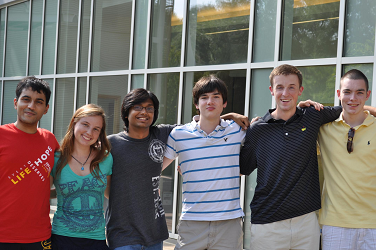Team:GeorgiaTech/Project
From 2011.igem.org
| You can write a background of your team here. Give us a background of your team, the members, etc. Or tell us more about something of your choosing. | |
|
Tell us more about your project. Give us background. Use this is the abstract of your project. Be descriptive but concise (1-2 paragraphs) | |
| Team Example |
| Home | Team | Official Team Profile | Project | Parts Submitted to the Registry | Modeling | Notebook | Safety | Attributions |
|---|
Contents |
Overall project
Overuse of antibiotics in medical settings has created the problem of extremely antibiotic resistant bacteria, also called “super bugs,” which develop through the process of horizontal gene transfer of plasmids. The experiment outlined in this proposal intends to engineer a unique method of “reverse” vaccination in which the plasmid containing antibiotic resistance genes is specifically targeted and destroyed, rendering the bacteria vulnerable to antibiotic treatment. The novel method we are developing utilizes a CRISPR system (Clustered Regularly Interspaced Short Palindromic Repeats) contained on a separate plasmid to inactivate the foreign DNA. The CRISPR system is a type of immunity used by about 40% of Bacteria and about 90% of Archaea. It consists of a series of proteins, called cas proteins, which are associated with series “spacers” separated by short palindromic sequences, that recognize foreign DNA (either plasmid or viral). If foreign DNA is recognized, the cell chops up the invading DNA. If the DNA is not recognized and the cell survives the infection, it then ‘saves’ pieces of the foreign DNA in subsequent spacers, to be used in future recognition of an attack (Figure 1)
 "
"
